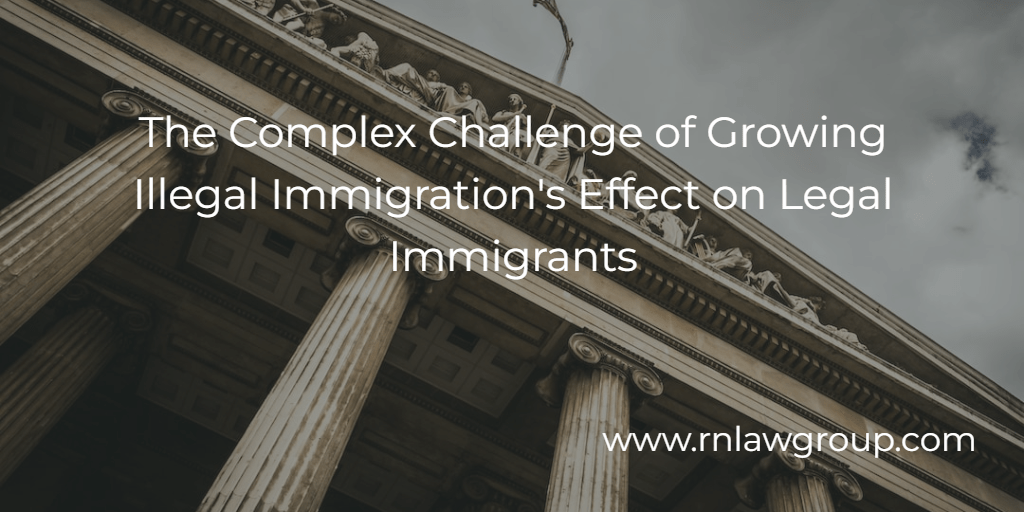
The Complex Challenge of Growing Illegal Immigration’s Effect on Legal Immigrants
A sensitive and complicated issue, illegal immigration is frequently viewed from a political and economic perspective. It’s important to note that it has important ramifications for legal immigrants as well. When illegal immigration rises, legal immigrants who have undergone the arduous process of getting the right to live and work in a new nation may encounter a number of difficulties. This article explores the sociological, economic, and legal facets of this topic as it digs into the various effects of increasing illegal immigration on legal immigrants.
Financial Difficulties for Legal Immigrants
Wage Suppression
The lowering of wages is one of the immediate economic issues that legal immigrants are facing in the face of increasing illegal immigration. Illegal immigrants can undercut the wages of legal immigrants in related businesses since they frequently work for lower pay and in subpar circumstances. When businesses have a ready supply of cheaper, undocumented labor, legal immigrants may find it more difficult to negotiate reasonable salaries and working conditions. This not only has an impact on the financial stability of legal immigrants, but it may also foster a feeling of injustice and animosity among employees.
Limited Employment Options
Legal immigrants may have fewer work possibilities due to increasing competition on the labor market brought on by a boom in illegal immigration. Legal immigrants who have complied with immigration laws may find themselves competing for a decreasing number of employment openings. Legal immigrants may struggle to find secure job since illegal immigrants sometimes accept lower salary and poor working conditions.
Skilled Immigrants: Recognition of Credentials
Many legal immigrants have excellent talents and qualifications, but getting their foreign credentials acknowledged in their new nation is frequently a challenge for them. The burden on public resources, such as job training and education programs, might worsen as illegal immigration rises. Legal immigrants may experience longer stretches of underemployment or unemployment and may find it significantly more difficult to have their foreign credentials recognized.
Integration and Assimilation
The effects of illegal immigration on legal immigrants from a sociocultural perspective are multifaceted. Legal immigrants frequently work to fit into the culture and society of their host nation, but when illegal immigration is on the rise, it can make this process more difficult. Regardless of their legal status, legal immigrants may face increased scrutiny and prejudice as a result of the unfavorable attitudes toward immigration. Their sense of belonging and level of integration may be hampered as a result.
Cultural Conflicts
Conflicts over culture can occasionally arise in immigrant communities as a result of the presence of illegal immigrants. Legal immigrants may believe that since illegal immigrants do not follow the same laws, their efforts to follow the law and integrate into the community are being undercut. The cohesiveness of immigrant communities may be harmed and division may result from these issues.
Language Disparities
Language problems for legal immigrants may become worse as a result of the abundance of illegal immigrants. Resources for language education and integration programs are scarce in many nations. Legal immigrants may find it even more difficult to use these resources with the surge of unauthorized immigrants, making it impossible for them to get past language obstacles, which are crucial for their integration and success.
Legal Difficulties
Immigration Backlogs
An increase in illegal immigration may put a strain on immigration authorities’ resources and lengthen the wait times for legal immigrants. Due to the overloaded immigration system, legal immigrants may experience lengthy wait times for the processing of their visas, green card applications, and citizenship requests. These delays may have a major impact on their life, causing family division and uncertainty regarding their immigration status.
Fear of Deportation
Legal immigrants may become anxious and fearful as a result of the increasing emphasis on immigration enforcement to stop illegal immigration. Legal immigrants’ mental and emotional health is affected by a constant worry about being mistaken for someone else or getting captured in an immigration raid.
Legal Uncertainty
For immigrants and the wider public, the intricate interactions between legal and illegal immigration can cause legal confusion. Due to their common racial or national origin with illegal immigrants, legal immigrants may experience discrimination or excessive scrutiny. This fosters a climate of distrust and may be upsetting for legal immigrants who have followed the law exactly.
Social and health services
Access to Healthcare
For legal immigrants, access to healthcare is a crucial concern, especially for those who do not yet have a job or health insurance. Public healthcare services may be overworked due to the presence of illegal immigrants, who frequently lack health insurance. Longer wait times and restricted access to healthcare services may be encountered by legal immigrants, which may be harmful to their health and wellbeing.
Social Services
Increased illegal immigration may also have an impact on social services including housing, food aid, and education. Legal immigrants may experience higher competition for these services, particularly if they are low-income or vulnerable. Legal immigrants may find it more difficult to get the assistance they need to integrate into their new communities due to a lack of resources and a higher demand for services.
Policies and Public Opinion
Negative Stereotypes
Growing illegal immigration frequently fuels unfavorable prejudices about immigrants as a whole, which has an impact on how legal immigrants are seen. Even after they have taken the legal route to immigration, legal immigrants may nevertheless face discriminatory views as a result of polarized public opinion.
Modifying Immigration Regulations
Legal immigrants may be impacted by changes to immigration laws as a result of the political response to illegal immigration. Legal immigrants may find it more difficult to connect with their relatives or obtain the requisite papers as a result of stricter immigration laws and fewer quotas. Legal immigrants may encounter more difficulties navigating the immigration system as a result of these measures.
Conclusion
Growing illegal immigration presents a complex dilemma that takes into account aspects of the economy, society, law, and public policy. While there are many elements to the difficult issue of illegal immigration, it’s crucial to take into account the situation of legal immigrants who have carefully followed the legal immigration process.
In light of the rise in illegal immigration, legal immigrants confront a variety of difficulties. They differ depending on unique factors such socioeconomic background, level of education, and the ability of the host nation to give resources. To handle the issues of both legal and illegal immigrants, governments, society, and immigration officials must adopt a balanced approach.
Possible tactics to overcome these difficulties include:
- Implement and enforce labor laws to guarantee that all workers, regardless of their immigration status, receive equitable treatment in terms of working conditions and pay.
- Programs for integration and education should be funded in order to assist lawful immigrants in successfully assimilating into the host society.
- Streamlined immigration procedures: To prevent backlogs and guarantee prompt processing of legitimate immigration applications, streamline the immigration system.
- Access to Social Services and Healthcare: Increase access to social services and healthcare for all citizens, ensuring that legal immigrants receive the assistance they need to succeed.
- Encourage community involvement and communication to improve relations between authorized and unauthorized immigrants, ease tensions, and strengthen immigrant communities.
It is critical to understand that immigration is a complicated problem with no universally applicable answer. It is a complex endeavor that calls for intelligent and comprehensive policies, as well as empathy and a commitment to maintaining the ideals of fairness and justice for all people who want a better life in a new country. Balancing the interests and concerns of both legal and illegal immigrants is a challenge.
By: Karim Jivani
Karim Jivani is a Special Attention Staff Attorney at Reddy Neumann Brown PC who focuses on employment-based non-immigrant visas. Karim’s practice covers all phases of the visa process including filing petitions, responding to Requests for Evidence (RFE), and drafting motions and appeals. He has completed over 30 RFE’s to date in response to H-1B, L-1, I-140, and VAWA petitions.

